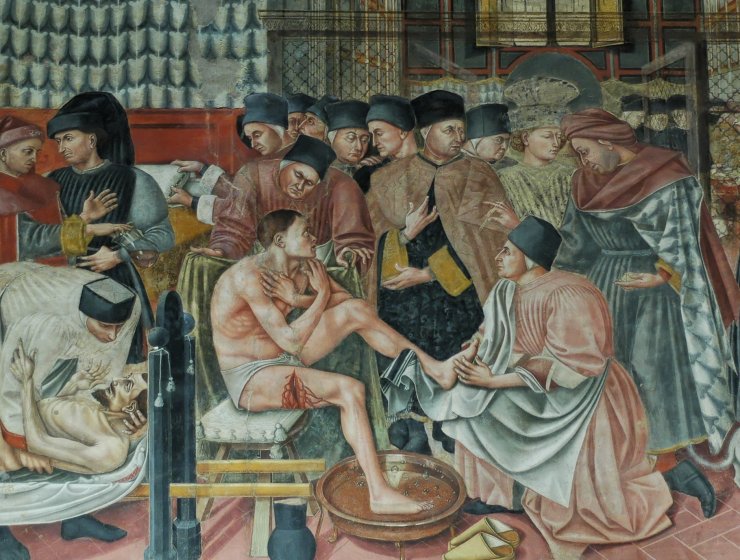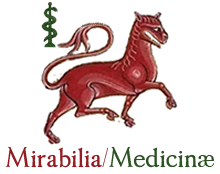
-Index-
Editorial: Teaching Medical Virtues
ANGOTTI NETO, Hélio
Original title: Editorial: Ensinando Virtudes Médicas
This edition of Mirabilia Medicinae discusses Virtues and Principles in Healthcare and Medical Education.
Can Virtues be taught in Medicine? Aristotle’s Virtue Theory and Medical Education and Clinical Practice
SHAH, Niloy; MARCUM, James A.
Original title: As Virtudes podem ser ensinadas em Medicina? Teoria Aristotélica das Virtudes, Educação Médica e Prática Clínica
In a complex and technologically sophisticated healthcare system, the utilization of virtues, which emphasizes the art of clinical practice, is often eclipsed by the technical science of its practice. Consequently, the training of physicians generally focuses on the objective and quantifiable science of clinical practice, which at times cripples the patient-physician relationship. To counter this impact on the patient-physician relationship, medical educators are developing pedagogical strategies to teach virtues to medical students and residents. But, can virtues be taught in medical school or in the clinic? To address this question, we explore how Aristotelian virtue theory can be integrated into the medical education experience, which leads to the formation of virtuous physicians. We then conclude by discussing issues surrounding the incorporation of virtues into the medical curriculum.
Living Will´s History: understanding the past and reflecting about the present
DADALTO, Luciana
Original title: História do Testamento Vital: entendendo o passado e refletindo sobre o presente
This article aims to make a historic effort about the living will, analyzing the emergence and development in the United States and the reception of the institute in Europe and Latin America. It is expected, therefore, to present to the reader an overview of the subject and a critical view of the institute in order to question the implementation of living wills and other patient consent from instruments in Brazil.
Philosophical aspects of medical schools with Problem-Based Learning: the Narcissus error
AGUILAR DA SILVA, Rinaldo Henrique
Original title: Aspectos filosóficos das escolas médicas com Aprendizagem Baseada em Problemas: o erro de Narciso
This paper present a critical analysis of the implementation of the National Curriculum Guidelines (DCN's) for medical courses relating them to Philosophical and Epistemological aspects. The Greek myth of Narcissus is used to think in the proposed challenges, questioning the teacher's role in this change.
The body in the pedagogical philosophy of Ramon Llull (1232-1316)
GIUBERTI, Fabricia dos Santos
Original title: O corpo na filosofia pedagógica de Ramon Llull (1232-1316)
Ramon Llull (1232-1316) in his work Doctrine for Children (c. 1274-1276) teaches his son Dominic that the human body is composed of four elements, an idea inherited from Greek medicine, and that such elements corrupt the man’s body. There are five senses: sight, hearing, smell, taste and touch. Through them, the man participates in external things. For the Mallorcan, bodily life is the actuality by which the body lives, and the spiritual life is to love God. From these principles, Llull teaches the child that he must love the bodily life and health because, through health, the soul and the body are convenient to each other, and the man lives by convenience.The purpose of this paper is to present the conception of Ramon Llull about the body as exposed on Doctrine for Children, methodologically combined with the historical perspective of Jacques Le Goff and Nicholas Truong in the work "A History of the Body in the Middle Ages".
Compassion – The Lost Pearl of Healthcare
CRUZ, Jorge
Original title: Compaixão – A pérola perdida dos cuidados de saúde
Compassion is on the list of virtues that many bioethicists consider indispensable for the provision of more humanized health care and taking into account the best interest of patients. After an introduction of the theory of virtue ethics and its importance to bioethics and healthcare, we will present the etymological and semantic meaning of the virtue of compassion, particularly from the perspective of Edmund D. Pellegrino and David C. Thomasma. Since, in our opinion, bioethical reflection only makes sense if it is relevant or could be applied to everyday clinical practice, we will present some practical examples involving the virtue of compassion especially in the doctor-patient relationship.


















































































